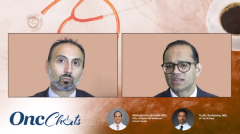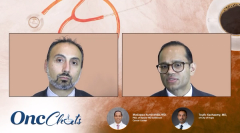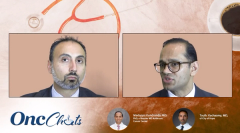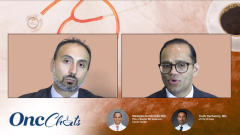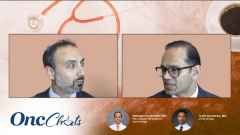
Understanding Endoscopy in the Realm of GI Cancers: Multidisciplinary Care
In this first episode of OncChats: Understanding Endoscopy in the Realm of GI Cancers, Madappa Kundranda, MD, PhD, and Toufic A. Kachaamy, MD, discuss the importance of endoscopic oncology as it relates to rising cancer incidence and multidisciplinary care in gastrointestinal cancer.
Episodes in this series

In this first episode of OncChats: Understanding Endoscopy in the Realm of GI Cancers, Madappa Kundranda, MD, PhD, and Toufic A. Kachaamy, MD, discuss the importance of endoscopic oncology as it relates to rising cancer incidence and multidisciplinary care in gastrointestinal cancer.
Kachaamy: Hello, my name is Toufic Kachaamy. I’m a gastroenterologist. I am [also] the chief of Medicine and the director of Gastroenterology at Cancer Treatment Centers of America in Phoenix. We’re part of City of Hope now. I’m joined today by Dr Madappa Kundranda, the Division Chief of Cancer Medicine at Banner MD Anderson in Phoenix, and the co-program director for the GI Oncology Cancer Program. At the 2023 Gastrointestinal Cancers Symposium, [we announced] a new video blog series on endoscopic oncology. Dr. Kundranda, can you start by telling us why this topic is relevant to the complex multidisciplinary care for GI cancer in today’s world.
Kundranda: Thank you, Dr Kachaamy, for the kind introduction. Let me start by providing some background first, in cancer, and then endoscopy, as it pertains to cancer care. The numbers are alarming with regards to cancer surpassing cardiovascular disease as the number 1 cause of death in many countries. At this point in time, we are diagnosing cancers at a much younger age in these patients. Most cancers aren’t hereditary; however, sadly, it’s becoming a family disease. What do I mean by that? It’s not uncommon to see a parent being affected by cancer. In addition to them caring for their cancer, they’re also taking care of their children and their parents, so they are sandwiched within this generation. Amid all this, this cancer diagnosis becomes such a critical part, and therefore, this use of multidisciplinary care is important.
However, the good news is that [we have seen] more patients [with cancer] have been cured in the past decade than ever before. Furthermore, patients are living much longer, even if they’re not cured of the disease, with a good quality of life. These emerging technologies, some of which [were presented] at this year’s ASCO GI, give us hope. However, we still have a long way to go with regard to treatment modalities.
Check back on Friday for the next episode in this series.


